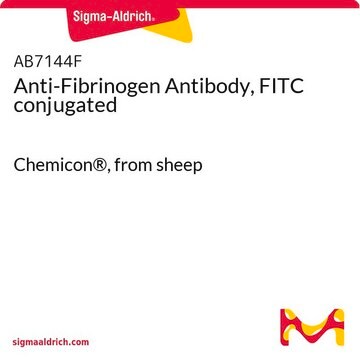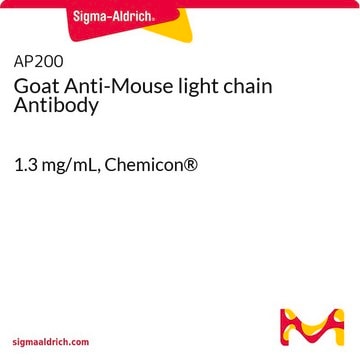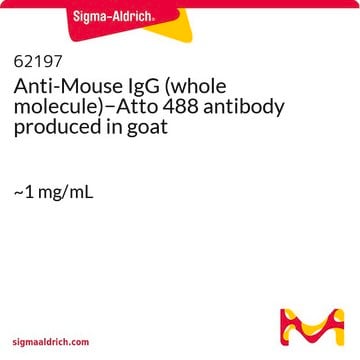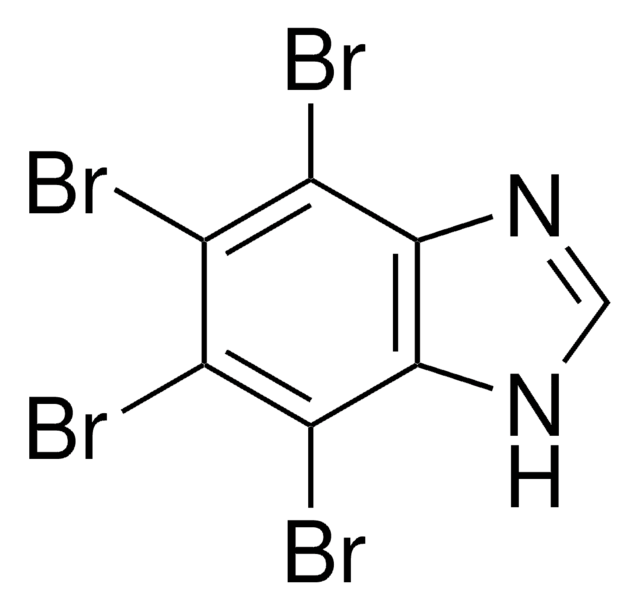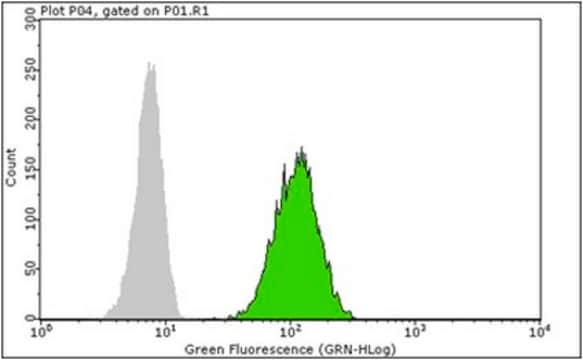AP181F
Goat Anti-Mouse IgG Antibody, FITC conjugate, Species Adsorbed
1.3 mg/mL, Chemicon®
Sign Into View Organizational & Contract Pricing
All Photos(1)
About This Item
UNSPSC Code:
12352203
eCl@ss:
32160702
NACRES:
NA.46
Recommended Products
biological source
goat
Quality Level
conjugate
FITC conjugate
antibody form
F(ab′)2 fragment of affinity isolated antibody
antibody product type
secondary antibodies
clone
polyclonal
species reactivity
mouse
manufacturer/tradename
Chemicon®
concentration
1.3 mg/mL
technique(s)
immunofluorescence: suitable
shipped in
wet ice
target post-translational modification
unmodified
Specificity
Mouse IgG (H+L) (absorbed for minimal cross-reactivity to Rat, Human, Bovine and Horse Serum Proteins)
FLUOROPHORE/PROTEIN ABSORBANCE RATIO:
Fluorescein Isothiocyanate 10.0 ug/mg; 3.8 moles FITC per IgG
FLUOROPHORE/PROTEIN ABSORBANCE RATIO:
Fluorescein Isothiocyanate 10.0 ug/mg; 3.8 moles FITC per IgG
Application
Goat anti-Mouse IgG Antibody, FITC conjugate, Species Adsorbed detects level of Mouse IgG & has been published & validated for use in IF.
Research Category
Secondary & Control Antibodies
Secondary & Control Antibodies
Research Sub Category
Secondary Antibodies Adsorbed for Dual Labeling
Secondary Antibodies Adsorbed for Dual Labeling
Suggested dilution for most applications: 1:50-1:200 for most applications.Optimal working dilutions must be determined by the end user.
Physical form
Lyophilized. Buffer = 0.01 M Sodium Phosphate, 0.25 M NaCl, pH 7.6, with .01% Thimerosal and .05% Sodium Azide.
RECONSTITUTION:
Reconstitute with 0.45 mg/mL with sterile distilled water.
RECONSTITUTION:
Reconstitute with 0.45 mg/mL with sterile distilled water.
Storage and Stability
Maintain lyophilized product at 2-8°C for up to 12 months. After reconstitution the product is stable for several weeks at 2-8°C as an undiluted liquid. For extended storage after reconstitution, add an equal volume of glycerol to make a final concentration of 50% glycerol followed by storage at -20°C in undiluted aliquots for up to 12 months. Please note the concentration of protein (and buffer salts) will decrease to one-half of the original after the addition of glycerol. Avoid repeated freeze/thaw cycles.
Legal Information
CHEMICON is a registered trademark of Merck KGaA, Darmstadt, Germany
Disclaimer
Unless otherwise stated in our catalog or other company documentation accompanying the product(s), our products are intended for research use only and are not to be used for any other purpose, which includes but is not limited to, unauthorized commercial uses, in vitro diagnostic uses, ex vivo or in vivo therapeutic uses or any type of consumption or application to humans or animals.
Not finding the right product?
Try our Product Selector Tool.
Hazard Statements
Precautionary Statements
Hazard Classifications
Aquatic Chronic 3
Storage Class Code
11 - Combustible Solids
WGK
WGK 3
Certificates of Analysis (COA)
Search for Certificates of Analysis (COA) by entering the products Lot/Batch Number. Lot and Batch Numbers can be found on a product’s label following the words ‘Lot’ or ‘Batch’.
Already Own This Product?
Find documentation for the products that you have recently purchased in the Document Library.
Broad and potent neutralizing human antibodies to tick-borne flaviviruses protect mice from disease.
Marianna Agudelo et al.
The Journal of experimental medicine, 218(5) (2021-04-09)
Tick-borne encephalitis virus (TBEV) is an emerging human pathogen that causes potentially fatal disease with no specific treatment. Mouse monoclonal antibodies are protective against TBEV, but little is known about the human antibody response to infection. Here, we report on
Lingjun Dong et al.
Cells, 11(19) (2022-10-15)
Lung ischemia-reperfusion injury (LIRI) is associated with many diseases, including primary graft dysfunction after lung transplantation, and has no specific and effective therapies. Necroptosis contributes to the pathogenesis of ischemia-reperfusion injury. Necrostatin-1 (Nec-1), the necroptosis inhibitor targeting RIPK1, has been
Eleonora Cimini et al.
Microorganisms, 7(9) (2019-09-25)
An expansion of effector/activated Vδ2 T-cells was recently described in acute Zika virus (ZIKV)-infected patients, but their role in the protective immune response was not clarified. The aim of this study was to define the antiviral activity of Vδ2 T-cells
Disruption of Caenorhabditis elegans muscle structure and function caused by mutation of troponin I.
Burkeen, AK; Maday, SL; Rybicka, KK; Sulcove, JA; Ward, J; Huang, MM; Barstead et al.
Biophysical Journal null
Duygu Gezen-Ak et al.
Noro psikiyatri arsivi, 51(2), 157-162 (2014-06-01)
Vitamin D, the main function of which is thought to be the maintenance of calcium and phosphate homeostasis and bone structure, has been shown in recent studies to have important roles in brain development as well. A certain vitamin D
Our team of scientists has experience in all areas of research including Life Science, Material Science, Chemical Synthesis, Chromatography, Analytical and many others.
Contact Technical Service

